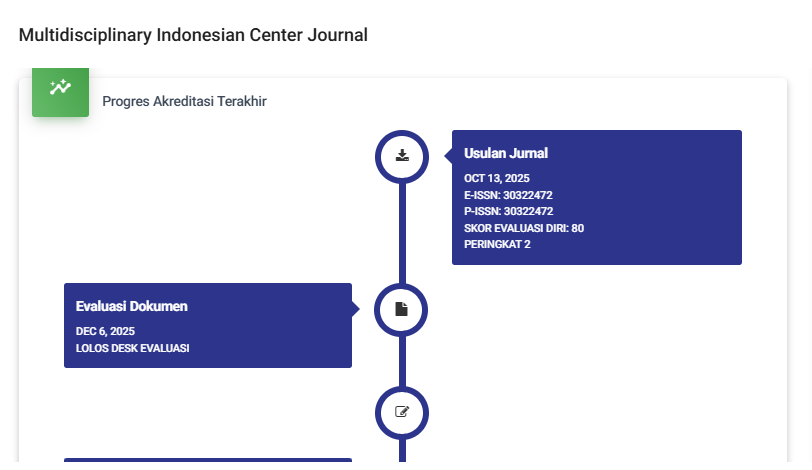MAQASHID AL-QUR'AN AND BUDGET EFFICIENCY
DOI:
https://doi.org/10.62567/micjo.v2i3.936Keywords:
Maqashid Al-Quran, budget efficiency, Islamic economics, budgeting policyAbstract
This study examines the relationship between the concept of Maqashid Al-Quran and the optimization of budget management in the context of Islamic economics. Using the systematic literature review method, this article collects and analyzes publications from Scopus indexed journals in the last 10 years to identify conceptual frameworks and indicators of budget efficiency that can be synergized with the principles of Maqashid Al-Quran. The findings of the study show that the implementation of maqashid values—such as the protection of soul, religion, intellect, descent, and property—can be the basis for formulating budgeting policies that are not only efficient but also socially just. In addition, this article develops an innovative analysis model, integrates budget efficiency indicators with the maqashid principle, and offers practical implementation recommendations for researchers and policymakers. The implications of this research are expected to help in the formulation of more holistic and progressive Islamic economic policies. This research has shown that the integration of the principles of Maqashid Al-Quran into budget management has the potential to improve fiscal policy by strengthening aspects of justice, transparency, and efficiency. Using the systematic literature review method, this article not only identifies gaps in the conventional literature, but also offers an innovative framework that can be used as a reference for researchers and practitioners in the development of Islamic economics. The implementation of this framework requires a joint commitment between stakeholders to reform fiscal governance and integrate ethical values at every policy stage. It is hoped that the results of this research will provide inspiration for the development of a long-term strategy that is progressive, based on maqashid in budget management, and will be an important contribution in realizing public governance that is fair, efficient, and oriented towards community welfare.
Downloads
References
Abdel-Haleem, M. (2014). Fiscal efficiency in the Arab economies. International Journal of Islamic and Middle Eastern Finance and Management, 7(3), 220-233.
Ahmad, S., & Zainal, R. (2017). Islamic perspectives on economic justice and fiscal policy. Journal of Islamic Economics, 10(1), 45-62.
Bakar, N. (2015). Integrating maqashid principles into public policy frameworks. Islamic Economic Review, 8(2), 101-117.
Denyer, D., & Tranfield, D. (2009). Producing a systematic review. In D. A. Buchanan & A. Bryman (Eds.), The Sage Handbook of Organizational Research Methods (pp. 671-689). Sage.
Fatimah, N. (2017). Synergy of Islamic ethics and economic efficiency. Journal of Islamic Business, 12(1), 78-95.
Hamid, R. (2021). Rethinking fiscal policy using maqashid: A normative framework. Contemporary Islamic Studies, 15(2), 134-151.
Hassan, M., & Rahman, F. (2014). Transparency and accountability in public budgeting: An Islamic perspective. Journal of Financial Regulation and Compliance, 22(3), 354-370.
Hassan, T. (2016). Maqashid al-Sharia in theory and in practice. Islamic Law Review, 31(1), 23-48.
Ibrahim, A. (2016). Efficiency in budget management: A comparative study of Islamic and conventional models. Journal of Islamic Economic Studies, 9(2), 89-106.
Kamali, M. H. (2015). Principles of Islamic jurisprudence. International Institute of Islamic Thought.
Mahmud, R. (2016). Budgetary reforms in Islamic countries: A case study analysis. International Journal of Public Budgeting, Accounting and Financial Management, 28(4), 512-530.
Miftah, S. (2018). Hybrid models in fiscal policy: Integrating maqashid and modern indicators. Journal of Economic Integration, 33(2), 153-171.
Nawawi, I. (2021). Revisiting Islamic financial governance: Maqashid and financial performance. Indonesian Journal of Islamic Economics, 17(1), 45-64.
Okoli, C., & Schabram, K. (2010). A guide to conducting a systematic literature review of information systems research. MIS Quarterly, 34(1), 28-57.
Petticrew, M., & Roberts, H. (2006). Systematic Reviews in the Social Sciences: A Practical Guide. Blackwell Publishing.
Rahim, N. (2019). Fiscal transparency in Islamic governments: Challenges and opportunities. Journal of Budget and Policy, 13(3), 287-306.
Rahman, M. (2018). The maqashid approach in Islamic economics and its policy implications. International Journal of Islamic Thought, 5(2), 112-130.
Siddiqi, N. (2017). Understanding maqashid al-sharia: A conceptual framework. Journal of Islamic Studies, 28(1), 67-85.
Sulaiman, H. (2018). Accountability and fiscal performance in emerging Islamic economies. Journal of Public Economics, 25(2), 199-215.
Tranfield, D., Denyer, D., & Smart, P. (2003). Towards a method for developing evidence‐informed management knowledge by means of systematic review. British Journal of Management, 14(3), 207-222.
Webster, J., & Watson, R. T. (2002). Analyzing the past to prepare for the future: Writing a literature review. MIS Quarterly, 26(2), xiii-xxiii.
Yusuf, A. (2020). Enhancing budget efficiency through Islamic fiscal principles: Empirical evidence from Muslim countries. Journal of Fiscal Studies, 12(1), 29-48.
Zainuddin, M. (2020). Equitable fiscal policies and the role of sharia in budget formulation. Review of Islamic Economics, 14(3), 205-225.
Zulkifli, F. (2020). Social justice and fiscal responsibility in Islamic governance. Indonesian Journal of Islamic Finance, 16(2), 98-116.
Downloads
Published
How to Cite
Issue
Section
License
Copyright (c) 2025 Samsul Ariyadi

This work is licensed under a Creative Commons Attribution-ShareAlike 4.0 International License.



























